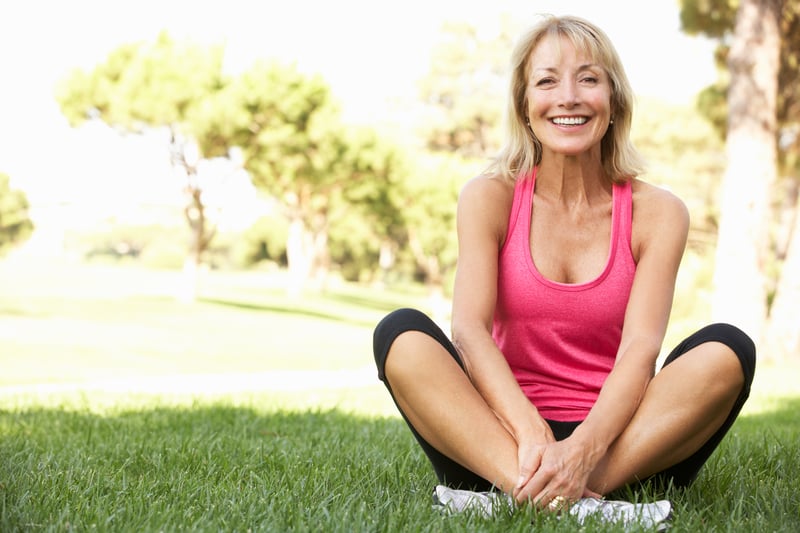How to Slow Aging Naturally (Use These 9 Simple Tips)

If you read magazines, websites, or even bestselling books, you may think of “aging” as the enemy—something to dread, fight, and prevent as long as possible. After all, no one wants to get old, and we certainly don’t want to look old. In today’s society, the message is loud and clear even before we hit our teens or 20s: Being “over the hill,” “of a certain age,” or just “old” is bad. Yet, aging is a fact of life for all of us. The moment we’re born, we begin aging. And, those negative stereotypes about aging can be hard on your health and may actually hinder you from being able to slow aging or to age gracefully.
“Don’t regret growing older. It’s a privilege denied to many.” – Unknown
It’s true. How you perceive aging can influence how well you age. Whether positive or negative, your attitude can influence your behaviors, psychology, and even biology. In that sense, aging is a self-fulfilling prophecy. Simply reframing your mindset on aging from anti-aging to “pro-aging” (which means accepting and being satisfied with your own aging process) can not only help you think differently about aging but also allow you to make better, healthier decisions and even strengthen your immune system. In other words, accepting and embracing your age and aging process can actually help slow aging. On the other hand, continuing to fight it and taking an “anti-aging” stance can do just the opposite—making you “old” long before your time.
Don’t believe it? In one study, Yale researchers surveyed 660 participants (aged 50 and older) as part of the Ohio Longitudinal Study of Aging and Retirement to see if their perception of aging had an influence on how long they lived. And get this, those who had a more positive attitude (measured up to 23 years earlier) about aging (for example, if they felt useful and happy as they got older) enjoyed improved blood pressure, cholesterol levels, body mass index, and tended to exercise more regularly. In turn, they lived an average of 7 ½ years longer than those who had a negative perception of aging.
Other research has indicated having a pro-aging attitude can help:
- Reduce disability
- Increase independence
- Increase engagement in preventive behaviors, such as eating healthy foods, exercising regularly, and getting annual physicals
- Support memory performance and prevent a decline in memory
- Decrease the risk of heart disease (by up to 80%)
Now, how do you feel about aging?
“…for there is nothing either good or bad, but thinking makes it so.” – William Shakespeare
While aging is inevitable, feeling old and tired is not. If you’re ready to accept and embrace aging, then in addition to changing how you think about aging, here are 9 more ways to slow aging and live a long, healthful, and happy life.
“There is a fountain of youth: it is your mind, your talents, the creativity you bring to your life and the lives of people you love. When you learn to tap this source, you will truly have defeated age.” – Sophia Loren
How to Slow Aging: 9 Simple Tips
Tip 1: Stand (and sit) up straight
A weak posture (with a caved-in chest and torso rolling forward) can lead to heart and lung issues. One study indicated that folks with poor posture have a 44% higher rate of mortality. In other words, folks with poor posture were 1.4 times more likely to die over the 3-year study period. Lack of attention to your posture can cause breathing problems, joint pain, difficulty walking, and issues with balance, which may lead to falls. Proper posture, on the other hand, helps you look younger, builds bone health, prevents injury, and allows you to breathe deeply.
Tip 2: Exercise regularly
If you’re looking for the ultimate fountain of youth, look no further than exercise. Numerous studies have found that regular exercise slows aging. Cardiorespiratory fitness is one of the best indicators of health and longevity, and research shows that better fitness can lower the risk of mortality by 60 – 70%. One study, for example, found the folks who exercised regularly enjoyed the immunity, strength, muscle mass, body fat, and cholesterol levels of a young person. In addition, the men who exercised regularly were able to maintain testosterone levels. The researchers concluded: “Find an exercise that you enjoy in whatever environment that suits you and make a habit of physical activity. You will reap the rewards in later life by enjoying an independent and productive old age.”
Tip 3: Nourish your body
It should come as no surprise that what we eat can have a huge effect on our appearance, health, and mood as we age. Enjoying a diet rich in a wide variety of colorful vegetables and fruits, quality fats (omega-3 in particular), and proteins (including collagen), while also low in sugar, refined grains and oils, and processed junk, has been shown to help slow aging.
Tip 4: Get (and stay) hydrated
Our bodies are mostly water, and we can’t survive without it. Drinking water not only hydrates every organ in the body and is needed for digestion, circulation, and the absorption of nutrients. Dehydrated cells are older, frailer, less healthy and happy cells. So, keep your water close by and drink up throughout the day.
Tip 5: Embrace Change
The only constant in life is change. Jobs, pets, homes, people, etc., will come and go throughout life. And your physical body is continually undergoing change whether you’re in your early 20s or late 70s. Every chapter of life not only comes with new challenges but new opportunities to embrace. And if you want to slow aging (which is why you’re reading this), then not only accepting change but embracing it is key.
Tip 6: Soothe Your Skin
While drinking water is a key to hydration, the rest of the cells drink up their full share before water is delivered to the skin. So, to help keep the skin hydrated, soft, and supple, it’s a good idea to hydrate and nourish it from the outside as well as the inside. Key ingredients to look for to help your skin hold onto moisture include:
- Hyaluronic acid
- Vitamin C
- Vitamin E
- Plant-derived squalene oil
Tip 7: Stay positive
Find what gives you the most joy and do it more. Create a gratitude journal and fill it out every day. Focusing on what makes you happy is one of the simplest ways to slow aging. Even better, research suggests that as folks age, they’re more likely to report feeling increased peace and happiness. And for that one simple reason, aging is something to look forward to.
Tip 8: Share happiness
Connection. It is one of the most important aspects of a healthy life. Sadly, true connections are decreasing due to a lack of time and attention. Lonely people are more likely to have difficulties in their daily activities and decreased mobility along with an increased risk of death. If you want to slow aging and enjoy your years longer, connections with others are vital. How vital? Having regular company cuts the risk of early death by over 50%. In addition, quality connections support a healthier immune system and faster recovery from illness along with lower rates of depression and anxiety and increased happiness. What better way to maintain connections than to share happiness, laughter, mutual pleasures, a walk outside, and a great conversation?
Tip 9: Check your style
Think that once you’re older how you look no longer matters? If you want to slow aging, you may want to rethink your (lack of) style. Revising your style, trying something new, and ensuring your clothes fit the body you have (rather than the body you may have had or wish for now) can help you both look and feel younger, allowing you to age more gracefully.
How to Slow Aging: A Recap
Aging is not something to dread, fight, or fret about. It happens to every single one of us. How you age, however, is very much in your control. Embrace this next chapter of life, and the next, and the one after to help you naturally slow aging while enjoying the adventure.
“We don’t stop playing because we grow old; we grow old because we stop playing.” – George Bernard Shaw









